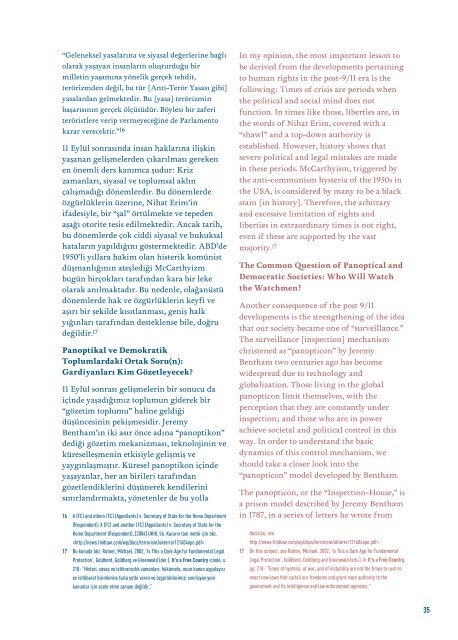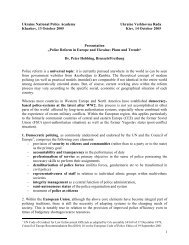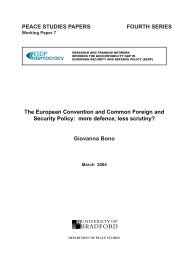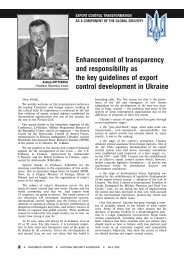Security Sector Governance: Turkey and Europe - DCAF
Security Sector Governance: Turkey and Europe - DCAF
Security Sector Governance: Turkey and Europe - DCAF
You also want an ePaper? Increase the reach of your titles
YUMPU automatically turns print PDFs into web optimized ePapers that Google loves.
“Geleneksel yasalar›na ve siyasal de¤erlerine ba¤l›<br />
olarak yaflayan insanlar›n oluflturdu¤u bir<br />
milletin yaflam›na yönelik gerçek tehdit,<br />
terörizmden de¤il, bu tür [Anti-Terör Yasas› gibi]<br />
yasalardan gelmektedir. Bu [yasa] terörizmin<br />
baflar›s›n›n gerçek ölçüsüdür. Böylesi bir zaferi<br />
teröristlere verip vermeyece¤ine de Parlamento<br />
karar verecektir.” 16<br />
11 Eylül sonras›nda insan haklar›na iliflkin<br />
yaflanan geliflmelerden ç›kar›lmas› gereken<br />
en önemli ders kan›mca fludur: Kriz<br />
zamanlar›, siyasal ve toplumsal akl›n<br />
çal›flmad›¤› dönemlerdir. Bu dönemlerde<br />
özgürlüklerin üzerine, Nihat Erim’in<br />
ifadesiyle, bir “flal” örtülmekte ve tepeden<br />
afla¤› otorite tesis edilmektedir. Ancak tarih,<br />
bu dönemlerde çok ciddi siyasal ve hukuksal<br />
hatalar›n yap›ld›¤›n› göstermektedir. ABD’de<br />
1950’li y›llara hakim olan histerik komünist<br />
düflmanl›¤›n›n ateflledi¤i McCarthyizm<br />
bugün birçoklar› taraf›ndan kara bir leke<br />
olarak an›lmaktad›r. Bu nedenle, ola¤anüstü<br />
dönemlerde hak ve özgürlüklerin keyfi ve<br />
afl›r› bir flekilde k›s›tlanmas›, genifl halk<br />
y›¤›nlar› taraf›ndan desteklense bile, do¤ru<br />
de¤ildir. 17<br />
Panoptikal ve Demokratik<br />
Toplumlardaki Ortak Soru(n):<br />
Gardiyanlar› Kim Gözetleyecek?<br />
11 Eylül sonras› geliflmelerin bir sonucu da<br />
içinde yaflad›¤›m›z toplumun giderek bir<br />
“gözetim toplumu” haline geldi¤i<br />
düflüncesinin pekiflmesidir. Jeremy<br />
Bentham’›n iki as›r önce ad›na “panoptikon”<br />
dedi¤i gözetim mekanizmas›, teknolojinin ve<br />
küreselleflmenin etkisiyle geliflmifl ve<br />
yayg›nlaflm›flt›r. Küresel panoptikon içinde<br />
yaflayanlar, her an birileri taraf›ndan<br />
gözetlendiklerini düflünerek kendilerini<br />
s›n›rl<strong>and</strong>›rmakta, yönetenler de bu yolla<br />
16 A (FC) <strong>and</strong> others (FC) (Appellants) v. Secretary of State for the Home Department<br />
(Respondent); X (FC) <strong>and</strong> another (FC) (Appellants) v. Secretary of State for the<br />
Home Department (Respondent), [2004] UKHL 56. Karar›n tam metni için bkz.<br />
.<br />
17 Bu konuda bkz. Ratner, Michael, 2002, ‘Is This a Dark Age for Fundamental Legal<br />
Protection’, Goldberd, Goldberg ve Greenwald (der.), It’s a Free Country içinde, s.<br />
218: “Histeri, savafl ve istikrars›zl›k zamanlar›; hükümete, onun kanun uygulay›c›<br />
ve istihbarat birimlerine fazla yetki veren ve özgürlüklerimizi s›n›rlayan yeni<br />
kanunlar için acele etme zaman› de¤ildir.”<br />
In my opinion, the most important lesson to<br />
be derived from the developments pertaining<br />
to human rights in the post-9/11 era is the<br />
following: Times of crisis are periods when<br />
the political <strong>and</strong> social mind does not<br />
function. In times like those, liberties are, in<br />
the words of Nihat Erim, covered with a<br />
“shawl” <strong>and</strong> a top-down authority is<br />
established. However, history shows that<br />
severe political <strong>and</strong> legal mistakes are made<br />
in these periods. McCarthyism, triggered by<br />
the anti-communism hysteria of the 1950s in<br />
the USA, is considered by many to be a black<br />
stain [in history]. Therefore, the arbitrary<br />
<strong>and</strong> excessive limitation of rights <strong>and</strong><br />
liberties in extraordinary times is not right,<br />
even if these are supported by the vast<br />
majority. 17<br />
The Common Question of Panoptical <strong>and</strong><br />
Democratic Societies: Who Will Watch<br />
the Watchmen?<br />
Another consequence of the post 9/11<br />
developments is the strengthening of the idea<br />
that our society became one of “surveillance.”<br />
The surveillance [inspection] mechanism<br />
christened as “panopticon” by Jeremy<br />
Bentham two centuries ago has become<br />
widespread due to technology <strong>and</strong><br />
globalization. Those living in the global<br />
panopticon limit themselves, with the<br />
perception that they are constantly under<br />
inspection; <strong>and</strong> those who are in power<br />
achieve societal <strong>and</strong> political control in this<br />
way. In order to underst<strong>and</strong> the basic<br />
dynamics of this control mechanism, we<br />
should take a closer look into the<br />
“panopticon” model developed by Bentham.<br />
The panopticon, or the “Inspection-House,” is<br />
a prison model described by Jeremy Bentham<br />
in 1787, in a series of letters he wrote from<br />
decision, see<br />
http://news.findlaw.com/wp/docs/terrorism/ukterror121604opn.pdf>.<br />
17 On this subject, see Ratner, Michael, 2002, ‘Is This a Dark Age for Fundamental<br />
Legal Protection’, Goldberd, Goldberg <strong>and</strong> Greenwald (eds.), in It’s a Free Country,<br />
pp. 218: “Times of hysteria, of war, <strong>and</strong> of instability are not the times to rush to<br />
enact new laws that curtail our freedoms <strong>and</strong> grant more authority to the<br />
government <strong>and</strong> its intelligence <strong>and</strong> law enforcement agencies.”<br />
35

















